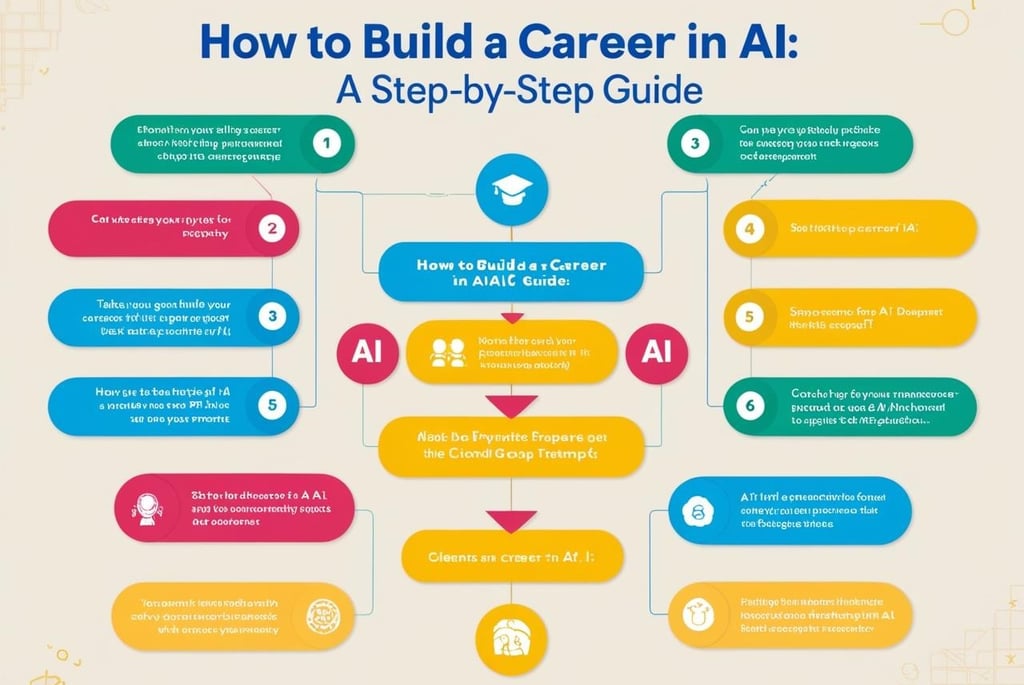How to Build a Career in AI: A Step-by-Step Guide
This step-by-step guide outlines how to build a successful career in AI, covering essential skills, recommended resources, and career-building tips. Whether you're just starting or transitioning to AI, this article offers clear paths to develop expertise and advance your career.
EDUCATION


Artificial intelligence (AI) is one of the most exciting and rapidly growing fields of the 21st century. From self-driving cars to personalized healthcare, AI is transforming industries and creating new opportunities for professionals worldwide. If you're passionate about technology, problem-solving, and innovation, a career in AI might be your calling.
In this comprehensive guide, we’ll walk you through the steps to build a successful career in AI, whether you're a student, a career changer, or an experienced professional looking to specialize in this dynamic field.
Why Pursue a Career in AI?
1. High Demand for AI Professionals
The demand for AI professionals is skyrocketing. According to recent studies, the global AI market is projected to grow exponentially, creating millions of jobs in fields like machine learning (ML), natural language processing (NLP), and robotics.
2. Lucrative Salaries
AI professionals command competitive salaries. In roles such as AI engineer, data scientist, and ML specialist, the median salary often exceeds $100,000 annually, with senior positions reaching $200,000 or more.
3. Diverse Opportunities
AI skills are applicable across industries, including healthcare, finance, education, manufacturing, and entertainment. This diversity allows you to align your career with your interests.
4. Impactful Work
AI professionals are at the forefront of solving global challenges, from climate change modeling to creating assistive technologies for people with disabilities.
Step 1: Understand the Fundamentals of AI
Before diving into AI, it’s essential to grasp its basics. AI encompasses several subfields, including:
- Machine Learning (ML): Algorithms that enable systems to learn from data and improve over time.
- Deep Learning (DL): A subset of ML focused on neural networks.
- Natural Language Processing (NLP): Techniques for understanding and generating human language.
- Computer Vision: Systems that interpret visual data from the world.
- Robotics: AI applied to physical machines.
Recommended Resources:
- Online courses: Coursera’s "AI for Everyone" by Andrew Ng.
- Books: Artificial Intelligence: A Modern Approach by Stuart Russell and Peter Norvig.
- Websites: aitoolsconsume.com for AI tools and updates.
A. Formal Education
- Undergraduate Degree: Most AI roles require a bachelor’s degree in computer science, engineering, mathematics, or a related field.
- Master’s Degree: A graduate degree in AI or ML can provide a competitive edge, especially for research-oriented roles.
B. Key Subjects to Focus On
- Mathematics: Linear algebra, calculus, probability, and statistics.
- Programming: Proficiency in Python, R, or Java.
- Data Structures and Algorithms: Fundamental to efficient AI coding.
- Domain Knowledge: Depending on your interest, delve into areas like biology for healthcare AI or finance for fintech AI.
Step 3: Learn AI-Specific Skills
Mastering AI requires both theoretical understanding and practical expertise. Focus on acquiring the following:
A. Programming Skills
- Languages: Python (most popular), R, Java, and Julia.
- Libraries and Frameworks: TensorFlow, PyTorch, Scikit-learn, and Keras.
B. Data Manipulation
- Learn to clean, preprocess, and analyze datasets using tools like Pandas and NumPy.
- Gain expertise in SQL for database management.
C. Model Development
- Study supervised, unsupervised, and reinforcement learning algorithms.
- Build projects involving neural networks, decision trees, and clustering.
D. Cloud Computing
- Familiarize yourself with platforms like AWS, Google Cloud, and Microsoft Azure for deploying AI models.
Recommended Practice Platforms:
- Kaggle: Participate in AI competitions.
- GitHub: Showcase your projects and collaborate with others.
Step 4: Gain Practical Experience
A. Build AI Projects
Create projects that demonstrate your skills. Examples include:
- Predicting house prices using ML.
- Building a chatbot using NLP.
- Developing a computer vision application for object detection.
B. Internships and Freelancing
Gain hands-on experience through internships or freelance projects. Platforms like Upwork and Fiverr often have AI-related gigs.
C. Contribute to Open-Source Projects
Collaborate on AI projects in communities like GitHub. This experience enhances your skills and builds your professional network.
Step 5: Specialize in a Subfield
AI is a vast domain. Specializing in a specific area can make you an expert and increase your employability. Popular specializations include:
A. Natural Language Processing (NLP)
Applications: Chatbots, sentiment analysis, language translation.
B. Computer Vision
Applications: Autonomous vehicles, facial recognition, medical imaging.
C. Robotics
Applications: Industrial automation, drones, assistive devices.
D. Ethical AI
Focus on creating fair, transparent, and unbiased AI systems.
Step 6: Build Your Professional Profile
A. Online Presence
- Create a LinkedIn profile highlighting your AI skills and projects.
- Use GitHub to showcase your code and repositories.
- Write articles or blogs (e.g., on https://aitoolsconsume.com) to establish yourself as an AI thought leader.
B. Networking
- Attend AI conferences, meetups, and hackathons.
- Join AI communities on platforms like Reddit, Discord, and LinkedIn.
C. Certifications
Certifications demonstrate your expertise to employers. Popular options include:
- Google AI/ML Certification.
- AWS Certified Machine Learning – Specialty.
- Microsoft Azure AI Engineer Certification.
Step 7: Apply for Jobs and Advance Your Career
A. Entry-Level Positions
Common roles for beginners:
- AI Engineer
- Data Scientist
- Machine Learning Developer
B. Job Search Tips
- Customize your resume to highlight relevant skills and projects.
- Use platforms like LinkedIn, Glassdoor, and Indeed to find job opportunities.
- Prepare for technical interviews by practicing coding and algorithm questions.
C. Continuous Learning
AI is an ever-evolving field. Stay updated by:
- Enrolling in advanced courses on Coursera or edX.
- Reading AI research papers.
- Experimenting with emerging tools and technologies.
Conclusion
Building a career in AI is a journey of continuous learning and growth. By following this step-by-step guide, you can acquire the knowledge, skills, and experience needed to excel in this dynamic field. Whether you're just starting or pivoting into AI, the opportunities are boundless.
Read more relevant articles: "Top AI Certifications for 2025: Elevate Your Career in Artificial Intelligence".

